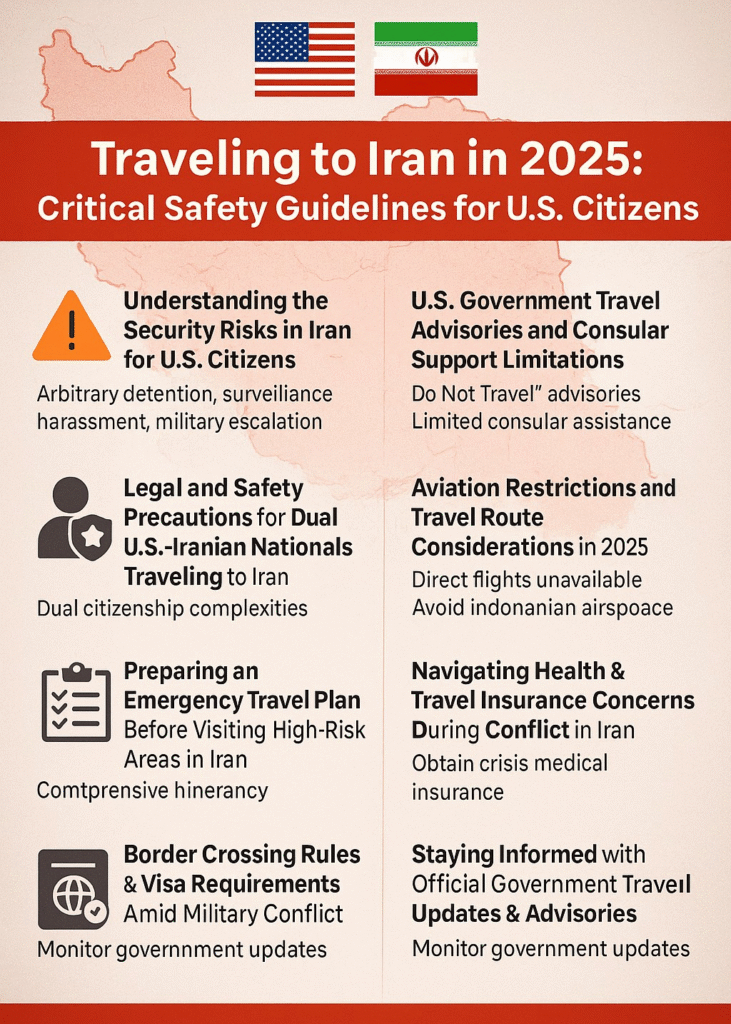
With rising tensions in the Middle East, traveling to Iran in 2025 is more complicated—and potentially more dangerous—than ever before for U.S. citizens. Whether you’re visiting family, exploring your roots, or traveling for business, understanding the risks and legal requirements is essential. This guide will walk you through the key safety, legal, and logistical considerations before you even book your flight.

🔒 Understanding the Security Risks for U.S. Citizens in Iran
Iran is currently under a Level 4: Do Not Travel advisory from the U.S. State Department. Risks include:
Arbitrary detention
Government surveillance
Lack of due process
Anti-American sentiment
If you’re a journalist, political activist, or even someone with a public profile, your risks are even higher.
📌 Check the latest U.S. Travel Advisory for Iran
🛂 Limited U.S. Government Support
The U.S. has no embassy in Iran, meaning consular support is extremely limited. If something goes wrong, assistance will come via the Swiss Embassy, which represents U.S. interests there.
📌 Swiss Embassy in Tehran – U.S. Interests Section
Also, make sure you enroll in the Smart Traveler Enrollment Program (STEP) to get real-time updates and alerts:
⚖️ Dual Nationals: Special Risks You Should Know
Iran does not recognize dual citizenship, so if you’re a U.S.–Iranian dual national:
You may be treated as an Iranian citizen
You could face travel bans or military service requirements
You may be denied U.S. consular access
📌 Learn more about Dual Nationality and Travel
✈️ 2025 Flight Routes & Aviation Restrictions
There are no direct flights from the U.S. to Iran. Most travelers connect via:
Istanbul (Turkey)
Doha (Qatar)
Dubai (UAE)
Due to regional tensions, many airlines avoid Iranian airspace. Be sure to check flight path safety:
📌 FAA International Notices
📌 ICAO Conflict Zones Info
📋 Make an Emergency Plan Before You Go
Traveling to a high-risk country like Iran means you must have an emergency plan, including:
Contact protocol with loved ones
A list of hospitals and emergency numbers
A secured backup evacuation route
Offline maps and resources in case of an internet blackout
🏥 Health & Travel Insurance in Conflict Zones
Most U.S.-based insurance companies do not cover Iran. You’ll need specialized insurance that includes:
Medical evacuation
Emergency health coverage
Conflict-related trip cancellations
📌 Compare Plans on TravelInsurance.com
📌 International Medical Group
📌 CDC Iran Travel Health Notices
🛃 Visa & Border Rules During Military Conflict
You must apply for a visa in advance, either via an Iranian tour operator or through the Iranian Interests Section at the Pakistani Embassy in Washington, D.C.
Land borders—especially near Iraq, Afghanistan, and Pakistan—may close with little or no warning.
📌 Apply for Iran e-Visa
📌 Iranian Interests Section Visa Info
📲 Stay Updated with Trusted Sources
Don’t rely on social media alone. Use official government sources for reliable updates:
U.S. State Department Advisories
Swiss Embassy Alerts
STEP Notifications
Trusted media like BBC, Al Jazeera, or Radio Farda
📌 Travel Advisory Homepage
📌 Swiss Embassy in Tehran
Traveling to Iran in 2025 as a U.S. citizen is not recommended unless absolutely necessary. With heightened tensions, limited diplomatic support, and the possibility of rapid escalation, you’ll need to plan every step carefully.
If you decide to go, do so fully informed—with a backup plan, solid insurance, and constant access to official updates. Your safety is in your hands more than ever.
Stay safe. Stay informed. And always travel smart.
